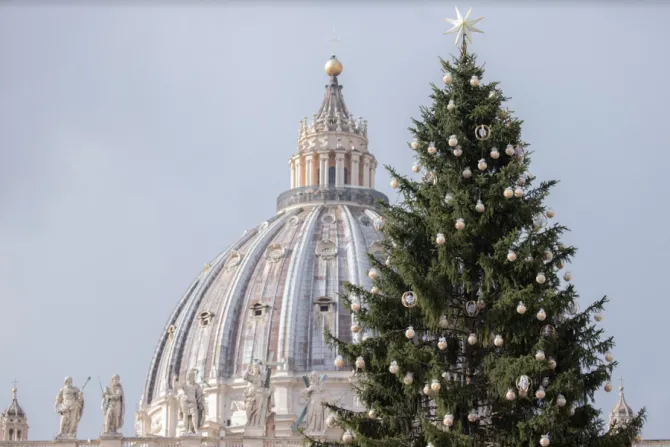The dome of St. Peter’s Basilica and the Vatican Christmas tree, Dec. 9, 2021. | Daniel Ibáñez/CNA.
The Vatican underlined its support for COVID-19 vaccines today amid global concern about the rapid spread of the omicron variant.
The Holy See press office issued a statement reiterating the Vatican’s stance on vaccines today, following the release of two new documents on the pandemic by curial departments and the first anniversary of a declaration by its doctrinal congregation.
It said: “Following today’s publication of the new documents of the Vatican COVID-19 Commission and the Pontifical Academy for Life, one year after the publication of the Note on the same topic by the Congregation for the Doctrine of the Faith and the official communiqué of the Pontifical Academies of Sciences and Social Sciences, it seems appropriate to reaffirm the Holy See’s position in favour of vaccines.”
“The Holy Father has defined vaccination as ‘an act of love,’ since it is aimed at the protection of people against COVID-19. In addition, he recently reiterated the need for the international community to further intensify its cooperation efforts so that all have rapid access to vaccines, not as a matter of convenience, but of justice.”
The Vatican’s intervention comes as countries around the world impose new restrictions aimed at slowing a rise in infections caused by the omicron variant, which is believed to spread more easily than the original SARS-CoV-2 virus.
The measures have prompted protests in several European countries.
An estimated 44,000 people attended a rally against compulsory vaccines in Vienna on Dec. 11, after the government announced that Austria would become the first Western country to introduce mandatory vaccination against COVID-19 from February 2022.
Italy has seen strikes and protests in response to the government’s decision to make the country’s Green Pass mandatory for workers.
A Green Pass proves that the holder has been vaccinated, tested negative every 48 hours, or recently recovered from COVID-19.
Wednesday’s Vatican statement did not touch on the debate about mandatory vaccination.
The Vatican last addressed the topic in December 2020, when the Congregation for the Doctrine of the Faith said in its “Note on the morality of using some anti-COVID-19 vaccines” that “vaccination is not, as a rule, a moral obligation and that, therefore, it must be voluntary.”
The doctrinal congregation added that Catholics who, for reasons of conscience, refuse vaccines produced with cell lines from aborted fetuses, “must do their utmost to avoid, by other prophylactic means and appropriate behavior, becoming vehicles for the transmission of the infectious agent.”
Pope Francis and senior Vatican officials have repeatedly urged Catholics to be vaccinated against the virus throughout 2021 and called for a just distribution of vaccines.
The Vatican began administering doses of the Pfizer-BioNTech vaccine in January and confirmed in February that Pope Francis and Pope Emeritus Benedict XVI had received the second dose of the vaccine. It began to administer the third dose in October.
Pope Francis recorded a public service announcement supporting vaccinations that was released in August in collaboration with the Ad Council.
In the PSA, he said: “Getting the vaccines that are authorized by the respective authorities is an act of love. I pray to God that each one of us can make his or her own small gesture of love, no matter how small, love is always grand.”
Since October, the Vatican has required all visitors and personnel to show a COVID-19 pass proving that they have been vaccinated, have recovered from the coronavirus, or have tested negative for the disease.
Three Swiss Guards quit after refusing to comply with the Vatican’s vaccine requirement and three other guards were suspended until they were fully vaccinated.
The Vatican COVID-19 Commission issued a document today called “Children and COVID-19.”
“The COVID-19 pandemic has thrown countless children into severe poverty and left many without parents and caregivers,” it said.
“Worldwide, there has been increased exploitation of and violence against children and reduced or suspended access to educational facilities. Governments, civil society organizations, and the Church must come together to alleviate the escalating suffering of the most vulnerable children among us.”
The Pontifical Academy for Life also released a text on Wednesday, entitled “Pandemic and Challenges for Education,” focusing on the difficulties facing children and adolescents.
“Even if its effects are not immediately evident, all over the world the psychosocial stress that children are subjected to as a result of the pandemic has resulted in distress and illnesses that have widely differing consequences based on age and social and environmental conditions,” it said.
Source: CNA

